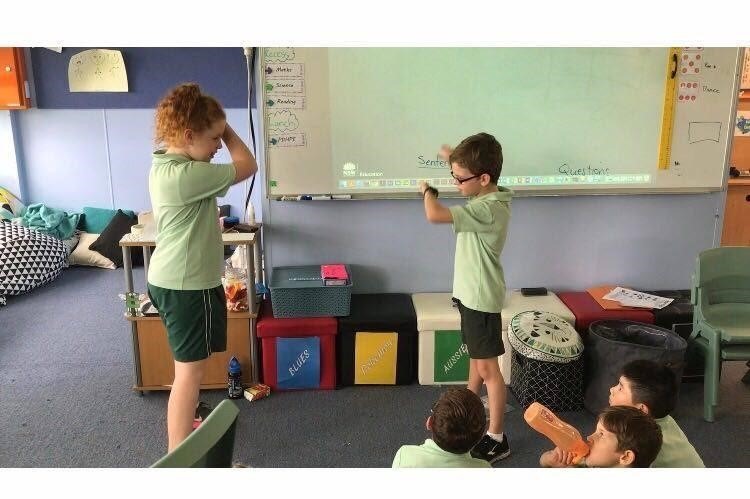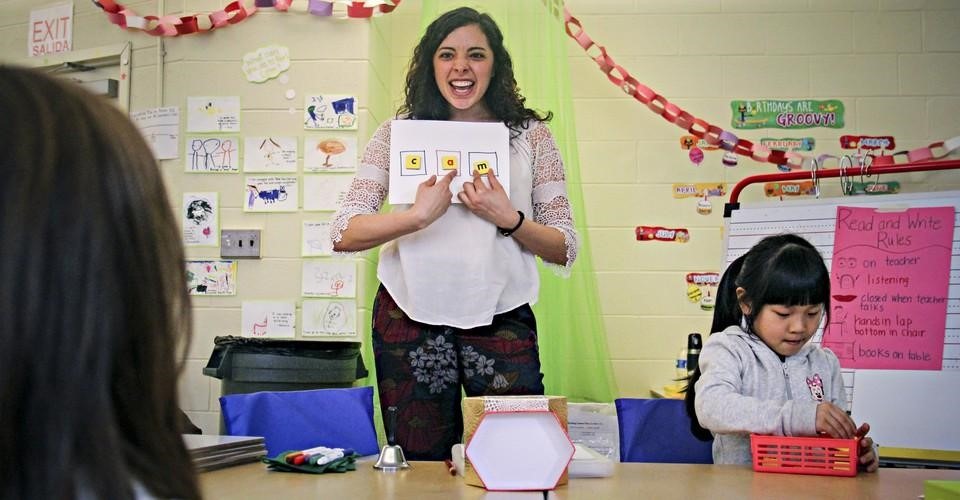No teacher is perfect and often there are suddenly five unexpected minutes in the class to fill. Instead of filling in the time with “fluff “, it is far better to have an instant pack of games up your sleeve so that you can pull them out when needed, meaning that your students will always be educationally occupied. The following five-minute filler games are simple instant games that require little or no preparation:
1/.Miming
Miming is a very practical and interactive way to practice keywords and phrases. It is a great way to encourage those students who are reluctant to speak in front of others as with students calling out possible answers as fast as they can, the focus is not on the person speaking but on the person doing the miming.
This game can be used for any vocabulary point and is suitable for all ages.
To play, the teacher quickly writes on small pieces of paper some words (e.g. vocabulary which has just been learnt / vocabulary within a category e.g. animals etc.) or actions/phrases (e.g. closing the door / changing a baby’s nappy etc.) Fold these over and put them in a box/bag so that students are not able to see what they are taking.
The class is then split into two teams and one student from each team comes out and without looking, takes a paper from the bag/box. Upon the teacher’s signal, both students start miming the action to their team. It is important that no props are used and that the person miming does not say anything.
The observing students shout out their suggestions, with the winning team being the one who has correctly guess the word/action/phrase first.
Miming is a great five-minute filler to encourage those students who are shy to speak out
2/. Call My Bluff
This five-minute filler is excellent to encourage speaking skills and encourages even the shyest students as because it is personal, they have a certain level of confidence.
The game can be played anytime and is especially invaluable at the beginning of the school year/beginning of a course since you are able to learn more about students whilst at the same time assessing their level of English, as you are able to observe their writing skills as well as hearing them speak.
It is recommended that the teacher starts the game so that the purpose is clearly explained, with students being able to afterward take the lead role. To start with, the teacher writes on the board three statements about themselves, of which two of them are true and one is a lie.
For example:
- I have visited 25 countries
- I was in the world yacht race
- I have been on television
The students then ask the teacher questions about each of the statements – for example, which countries did you visit? How large was the yacht you were on? What were you doing on television? etc.
After a few minutes of questions, the students are then asked to guess which of the statements is a lie. If the students guess correctly then they are the winners – if they guess incorrectly then the teacher is the winner.
This game can then be continued with either one student taking on the role and writing on the board with the rest of the class asking questions and guessing ( most suitable for small classes ) or students being paired up and taking it in turns to be the person to write the three statements.
3/.Jumbled Sentence Race- simplest five-minute filler
This game is a wonderful way to develop word-ordering skills in a fun manner. The strong sense of competitiveness and speed enables those who are generally quieter and shy an opportunity to forget their inhibitions and as it is both interactive and physical it is a great game to reinvigorate a class.
To play this game the teacher writes out some sentences (these can focus on key vocabulary/tenses etc.) with one colour being used for each sentence (to avoid mixing them up if students are in a small classroom)
Depending on the level of your students, you may want to only give them one sentence, whilst for those more advanced you can have two sentences.
Featured Job
Cut up the sentences into individual words/phrases and put ONE sentence (cut up) into one container
Divide the class into teams and give each team a container with one sentence (for those more advanced students mix two containers so that they have two sentences split into words in one container)
On the teacher’s signal, the students work as teams to try to unscramble the words to form sentences. The winners are the team that is able to put the words into the correct order to form the correct sentence.
Five-minute filler games are always fun and energetic
4 / Word Chain
To play this simple game the students can either stand in a circle or if you have a larger class and there is no space for this, then the students can just respond from their desk area( although make clear which direction will be going in e.g. front of the class to the back /across rows etc. )
It is a good idea to ask the students to stand up so that they feel more fully involved. To make this five-minute filler game more interactive you can also include a ball, with students throwing the ball from one person to another.
Students stand in a circle or just stand up where they are (depending on the layout of your classroom).
To play, the first student is given a letter of the alphabet (you do not always have to start at a) and they need to say a word that begins with that letter. This can be related to the topics in hand or just words in general (depending on the student’s ability) – for example, the topic is animals and the first letter is l – student says “lion “
The ball is then passed over (if the ball is used) otherwise, the next turn is simply passed over to the next student and they say a word that starts with the last letter of the first word – for example, n. You can also add another dimension to this game if desired, with the students also writing the word on the board (or ideally with their own individual whiteboards)
The game then continues around the class.
5/. Odd one out
In this game, the teacher can offer the words and ask students to guess the relationship or demonstrate once and then ask students to continue.
The point of the game is to say three or four things that have a relationship and one that is different. This can be played on a variety of levels from the very simple – e.g. skirt /socks/t-shirt/banana (the banana is the odd one out as the rest are all clothes) to much more complex – for example – dad/gang/butter / diced / toast (butter is the odd one out as it is the only word which has a different beginning and ending letter)
With these simple games ready at your fingertips, your lessons will be guaranteed to run smoothly. Remember that there are a lot of other ESL five-minute filler games that you can play – some with no preparation and others with some basic tasks prior to the lesson. The important thing is to be creative – you can always make up your own games or add your own slant on the basic game format!
Are you facing difficulties in finding and securing teaching positions in Vietnam? Are visa procedures causing you trouble? Feeling overwhelmed and directionless upon your arrival in Vietnam for teaching assignments? Don’t worry, VTJ’s English Teaching Placement in Vietnam (EPIV) Program 2024 provides comprehensive support to solve ALL the matters.
👉👉👉 Click HERE to request free consultation






